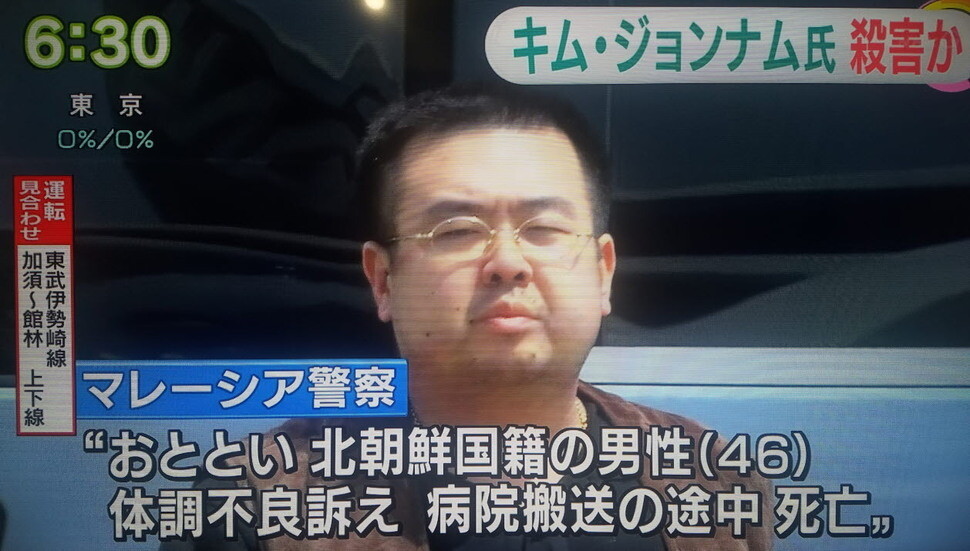hankyoreh
Links to other country sites 다른 나라 사이트 링크
Japanese media spreading questionable reports on Kim Jong-nam’s death

The Japanese media counts scrupulous reporting based on careful confirmation of the facts as one of its strengths - in every case but one. The exception is its reporting when it comes to “enemy state” North Korea. Since the death of former North Korean leader Kim Jong-il’s oldest son Jong-nam on Feb. 13, the Japanese media has come out with a number of false and unreliably sourced reports.
Following reports of Kim Jong-nam’s unexpected killing the day before, Japan’s Kyodo News Agency reported on the morning of Feb. 15 that two women who had apparently taken part in the assassination “may already be dead,” citing a Japanese government official. Coming amid speculation that Pyongyang was likely to have been responsible for Kim’s death, the report set off shock waves in both Japan and South Korea. In addition to feeding suspicions that the murder was done by North Korean agents, the report had the effect of making the Pyongyang regime appear like something out of a spy movie - ruthless enough to eliminate its own agents after they performed their mission. But the report ended up proved false that afternoon with the arrest by Malaysian police of one suspect, a 29-year-old Vietnamese woman named Doan Thi Huong.
In a piece published just after the arrest of a second suspect at around 11:50 am on Feb. 16, Kyodo reported that the woman “had a South Korean passport.” Numerous South Korean news outlets rushed to quote the agency, only to have it correct the piece less than hour later to identify the suspect as being an Indonesian national.
In many cases, news outlets run front-page stories with reports based on quotes that are difficult to confirm. On Feb. 17, the Sankei Shimbun newspaper published a front-page report quoting “multiple sources” as saying the killing “may have occurred because Kim Jong-nam was in contact with forces intending to back a successor to the Kim Il-sung bloodline to establish a government in exile.” The previous day, the Asahi Shimbun newspaper printed a front-page piece quoting a “Chinese government official” as saying Kim had “been attacked in 2012 apparently by North Korean agents in Beijing.”
But both reports bordered on hearsay, using second-hand sources and expert statements to speculate on what “might have” been the case. It was the sort of reporting that would never have been printed on the front page had the articles not been about North Korea.
Often, the Japanese media reports are based on speculative pieces from conservative-leaning South Korean news outlets. The result can be a vicious cycle in which the reports are supplemented and given prominent placement by the Japanese news outlets, which are then quoted back and expanded on by their South Korean counterparts. It’s also a reporting practice that thrives due to the Japanese public’s antipathy toward North Korea and overheated competition among Japanese news outlets to report on it.
On Feb. 17, the Yomiuri Shimbun newspaper concluded Kim’s killing was “apparently caused by North Korea’s Reconnaissance General Bureau” and reported that the “use of women and poison was a characteristic tactic for North Korean agents.”
By Gil Yun-hyung, Tokyo correspondent
Please direct questions or comments to [english@hani.co.kr]

Editorial・opinion
![[Column] Park Geun-hye déjà vu in Yoon Suk-yeol [Column] Park Geun-hye déjà vu in Yoon Suk-yeol](https://flexible.img.hani.co.kr/flexible/normal/500/300/imgdb/original/2024/0424/651713945113788.jpg) [Column] Park Geun-hye déjà vu in Yoon Suk-yeol
[Column] Park Geun-hye déjà vu in Yoon Suk-yeol![[Editorial] New weight of N. Korea’s nuclear threats makes dialogue all the more urgent [Editorial] New weight of N. Korea’s nuclear threats makes dialogue all the more urgent](https://flexible.img.hani.co.kr/flexible/normal/500/300/imgdb/original/2024/0424/7317139454662664.jpg) [Editorial] New weight of N. Korea’s nuclear threats makes dialogue all the more urgent
[Editorial] New weight of N. Korea’s nuclear threats makes dialogue all the more urgent- [Guest essay] The real reason Korea’s new right wants to dub Rhee a founding father
- [Column] ‘Choson’: Is it time we start referring to N. Korea in its own terms?
- [Editorial] Japan’s rewriting of history with Korea has gone too far
- [Column] The president’s questionable capacity for dialogue
- [Column] Are chaebol firms just pizza pies for families to divvy up as they please?
- [Column] Has Korea, too, crossed the Rubicon on China?
- [Correspondent’s column] In Japan’s alliance with US, echoes of its past alliances with UK
- [Editorial] Does Yoon think the Korean public is wrong?
Most viewed articles
- 1[Column] Park Geun-hye déjà vu in Yoon Suk-yeol
- 2Will NewJeans end up collateral damage in internal feud at K-pop juggernaut Hybe?
- 3N. Korean hackers breached 10 defense contractors in South for months, police say
- 4[Guest essay] The real reason Korea’s new right wants to dub Rhee a founding father
- 5Up-and-coming Indonesian group StarBe spills what it learned during K-pop training in Seoul
- 6[Editorial] Japan’s rewriting of history with Korea has gone too far
- 7Why Korea shouldn’t welcome Japan’s newly beefed up defense cooperation with US
- 8Terry Anderson, AP reporter who informed world of massacre in Gwangju, dies at 76
- 9Thursday to mark start of resignations by senior doctors amid standoff with government
- 10Senior doctors cut hours, prepare to resign as government refuses to scrap medical reform plan